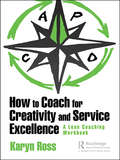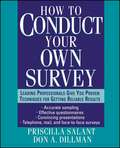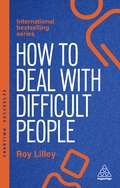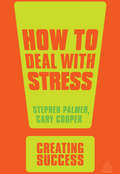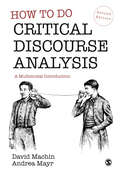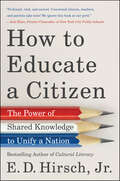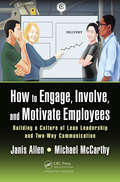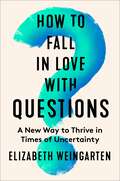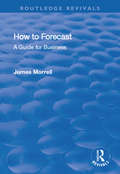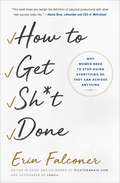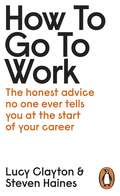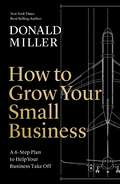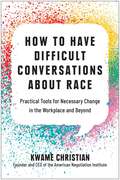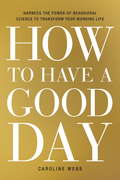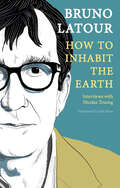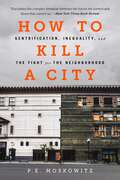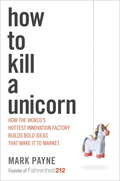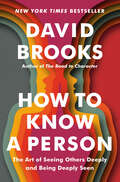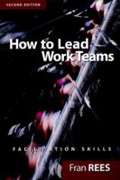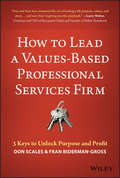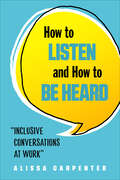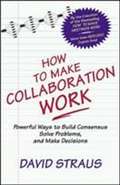- Table View
- List View
How to Coach for Creativity and Service Excellence: A Lean Coaching Workbook
by Karyn RossHow to Coach for Creativity and Service Excellence: A Lean Coaching Workbook is a self-contained workbook, in which the reader completes twenty-one days of practical exercises and activities focused on creativity, lean and coaching (one set per day). This will enable the reader to develop their capability and confidence to be creative, adapt lean principles, practices and tools to their unique service organization and coach others to do the same. The workbook guides the reader through a structured, systematic, easy-to-understand, habit-building approach, and function as the reader’s ‘coach’. As the reader ‘works’ their way through the book, they will reclaim their creativity, learn Karyn’s tried-and-true 15-minute a day coaching approach and adapt lean principles, practices and tools to their particular service organization. As an internationally acclaimed lean consultant, highly experienced coach and coauthor of The Toyota Way to Service Excellence, Karyn Ross is often asked to help service organizations that are struggling to translate lean principles into the sustainable practices that will meet their - and their customers' - unique needs, now and for the long-term. Over the years, Karyn has found that the best way for organizations to overcome this struggle is to develop a network of coaches who can help people at all levels: • Learn by ‘doing’. Changing what we do – and seeing the different result - changes how we think, not the opposite! • Adapt lean in a way that makes sense for their service organization. Lean practitioners working in service organizations may have difficulty adapting lean manufacturing practices to meet the special ‘people’ considerations found in services. • Practice continuously to make a habit. Coaching helps people develop the discipline and stamina needed to turn new behaviors into habits. That’s the beauty of this book! It functions as the reader’s personal ‘coach’, guiding them through the daily practice required to make new behaviors (and the resulting new thinking) a habit, so that they can coach their organization to success!
How to Conduct Your Own Survey
by Don A. Dillman Priscilla SalantA nuts-and-bolts guide to conducting your own professional-quality surveys without paying professional fees. How can you gauge public support for a cause or test the market for a product or service? What are the best methods for validating opinions for use in apaper or dissertation? A well-documented survey is the answer. But what if you don't have thousands of dollars to commission one? N oproblem. How to Conduct Your Own Survey gives you everything you need to do it yourself! Without any prior training, you can learn expert techniques for conducting accurate, low-cost surveys. In step-by-step, down-to-earth language, Priscilla Salant and Don A. Dillman give you the tools you need to: Determine which type of survey is best for you Estimate the cost of your survey Conduct mail, telephone, and face-to-face surveys Draw accurate samples Write effective questionnaires Compile and report results Avoid common survey errors Find reliable outside assistance And much more
How to Create the Perfect Wife: Britain's Most Ineligible Bachelor and his Enlightened Quest to Train the Ideal Mate
by Wendy MooreThomas Day, an 18th-century British writer and radical, knew exactly the sort of woman he wanted to marry. Pure and virginal like an English country maid yet tough and hardy like a Spartan heroine, she would live with him in an isolated cottage, completely subservient to his whims. But after being rejected by a number of spirited young women, Day concluded that the perfect partner he envisioned simply did not exist in frivolous, fashion-obsessed Georgian society. Rather than conceding defeat and giving up his search for the woman of his dreams, however, Day set out to create her. So begins the extraordinary true story at the heart of How to Create the Perfect Wife, prize-winning historian Wendy Moore's captivating tale of one man's mission to groom his ideal mate. A few days after he turned twenty-one and inherited a large fortune, Day adopted two young orphans from the Foundling Hospital and, guided by the writings of Jean-Jacques Rousseau and the principles of the Enlightenment, attempted to teach them to be model wives. After six months he discarded one girl, calling her "invincibly stupid," and focused his efforts on his remaining charge. He subjected her to a number of cruel trials--including dropping hot wax on her arms and firing pistols at her skirts--to test her resolve but the young woman, perhaps unsurprisingly, eventually rebelled against her domestic slavery. Day had hoped eventually to marry her, but his peculiar experiment inevitably backfired--though not before he had taken his theories about marriage, education, and femininity to shocking extremes. Stranger than fiction, blending tragedy and farce, How to Create the Perfect Wife is an engrossing tale of the radicalism--and deep contradictions--at the heart of the Enlightenment.
How to Deal with Difficult People: Fast, Effective Strategies for Handling Problem People (Creating Success)
by Roy LilleyLearn how to navigate the bullies, manipulators and complainers who drive you mad. With example dialogue and techniques, it will help you navigate tricky situations and keep your cool.By understanding the motives and individual behaviours of difficult people, you can learn to manage aggression, reduce awkwardness and remain the better person. This 6th edition of the bestselling Dealing with Difficult People features practical exercises, useful templates and top tips you need to get the best out of the worst, including how to deal with difficult customers, dealing with difficult people in the digital sphere, advice on beating bullies at their own game and how to deal with a boss who drives you barmy.The Creating Success series of books...Unlock vital skills, power up your performance and get ahead with the bestselling Creating Success series. Written by experts for new and aspiring managers and leaders, this million-selling collection of accessible and empowering guides will get you up to speed in no time. Packed with clever thinking, smart advice and the kind of winning techniques that really get results, you'll make fast progress, quickly reach your goals and create lasting success in your career.
How to Deal with Stress
by Stephen Palmer Cary CooperStraightforward, easy to read and practical, How to Deal with Stress, 3rd edition will put you back in charge of your life. Written by two internationally-recognized experts in the field of stress management, Cooper and Palmer provide a thorough understanding of the psychological causes of stress and the resulting physical effects, enabling you to build your own personal plan, improve well-being and enhance your performance at work. Full of insight and examples from real people, a brand new chapter provides a practical worksheet to help you develop your problem solving skills and reduce stress day-to-day. Crammed full of techniques on how to deal with stressed employees and colleagues, How to Deal with Stress will help you achieve the ultimate long term goal.
How to Do Critical Discourse Analysis: A Multimodal Introduction
by David Machin Andrea MayrWant to use Critical Discourse Analysis, but not sure where to start? This book is the complete toolkit you need. Each chapter presents distinct concepts and ideas in Critical Discourse Analysis, explaining how to use them in your research – and why. Packed with case studies of news texts, social media content, memes, promotional videos, institutional documents, infographics and webpages, the book shows you how to apply each set of tools to real life examples. Most importantly, examples, case studies, and revised opening chapters of this second edition show how multimodal Critical Discourse Analysis can help us to understand the role of language in the functioning of society and politics today, shaping our priorities for what to do and how to act. This book is an inspiring and valuable resource for any undergraduate students and researchers who wish to understand and use Critical Discourse Analysis. David Machin is Professor of Linguistics at Shanghai International Studies University. Andrea Mayr is an Associate Professor at Zayed University.
How to Do Critical Discourse Analysis: A Multimodal Introduction
by David Machin Andrea MayrWant to use Critical Discourse Analysis, but not sure where to start? This book is the complete toolkit you need. Each chapter presents distinct concepts and ideas in Critical Discourse Analysis, explaining how to use them in your research – and why. Packed with case studies of news texts, social media content, memes, promotional videos, institutional documents, infographics and webpages, the book shows you how to apply each set of tools to real life examples. Most importantly, examples, case studies, and revised opening chapters of this second edition show how multimodal Critical Discourse Analysis can help us to understand the role of language in the functioning of society and politics today, shaping our priorities for what to do and how to act. This book is an inspiring and valuable resource for any undergraduate students and researchers who wish to understand and use Critical Discourse Analysis. David Machin is Professor of Linguistics at Shanghai International Studies University. Andrea Mayr is an Associate Professor at Zayed University.
How to Do Things with Pornography
by Nancy BauerFeminist philosophers have made important strides in altering the overwhelmingly male-centric discipline of philosophy. Yet, in Nancy Bauer’s view, most are still content to work within theoretical frameworks that are fundamentally false to human beings’ everyday experiences.<P><P> This is particularly intolerable for a species of philosophy whose central aspiration is to make the world a less sexist place. How to Do Things with Pornography models a new way to write philosophically about pornography, women’s self-objectification, hook-up culture, and other contemporary phenomena. Unafraid to ask what philosophy contributes to our lives, Bauer argues that the profession’s lack of interest in this question threatens to make its enterprise irrelevant.<P>Bauer criticizes two paradigmatic models of Western philosophizing: the Great Man model, according to which philosophy is the product of rare genius; and the scientistic model, according to which a community of researchers works together to discover once-and-for-all truths. The philosopher’s job is neither to perpetuate the inevitably sexist trope of the philosopher-genius nor to “get things right.” Rather, it is to compete with the Zeitgeist and attract people to the endeavor of reflecting on their settled ways of perceiving and understanding the world.
How to Educate a Citizen: The Power of Shared Knowledge to Unify a Nation
by E. D. Hirsch Jr.Why a dumbed-down curriculum is bad for our democracy: “A persuasive, scientifically sound case for an education revolution.” — Shelf AwarenessIn How to Educate a Citizen, E.D. Hirsch continues the conversation he began thirty years ago with his classic bestseller Cultural Literacy, urging America’s public schools, particularly at the elementary level, to educate our children more effectively to help heal and preserve the nation. Since the 1960s, our schools have been relying on “child-centered learning.” History, geography, science, civics, and other essential knowledge have been dumbed down by vacuous learning “techniques” and “values-based” curricula; indoctrinated by graduate schools of education, administrators and educators have believed they are teaching reading and critical thinking skills. Yet these cannot be taught in the absence of strong content, Hirsch argues.The consequence is a loss of shared knowledge that would enable us to work together, understand one another, and make coherent, informed decisions. A broken approach to school not only leaves our children underprepared and erodes the American dream but also loosens the bonds that hold the nation together. Drawing on early schoolmasters and educational reformers such as Noah Webster and Horace Mann, Hirsch charts the rise and fall of the American early education system and provides a blueprint for closing the national gap in knowledge, communications, and allegiance. Critical and compelling, How to Educate a Citizen galvanizes our schools to equip children with the power of shared knowledge.“Concerned citizens , teachers, and parents take note! We ignore this book at our peril.” —Joel Klein, former Chancellor of New York City Public Schools
How to Engage, Involve, and Motivate Employees: Building a Culture of Lean Leadership and Two-Way Communication
by Michael McCarthy Janis AllenThis book, which takes the employees' perspective, illustrates what works and what doesn't work to engage, involve, and motivate a workforce. Through examples, it shows how the "engage" methodology links to the Lean Process. While focusing on the softer/"people" part of Lean, it maximizes the value returned on the organization's investment in Lean. It links "engagement" to measurable performance improvements. The how-to book includes a methodology overview and details on how to implement including communication do's and don'ts as well as a checklist for leader standard work (a tool for individual leaders to track and be recognized for their "engage, involve, and motivate" behaviors).
How to Fall in Love with Questions: A New Way to Thrive in Times of Uncertainty
by Elizabeth WeingartenJournalist and applied behavioral scientist Elizabeth Weingarten charts a new path to embrace the questions of our lives instead of seeking fast, easy answers.What do you do when faced with a big, important question that keeps you up at night? Many people, understandably, seize answers dispensed by “experts,” influencers, gurus, and more. But these fast, easy, one-size-fits-all solutions often fail to satisfy, and can even cause more pain.What if our questions—the ones we ask about relationships, work, meaning, identity, and purpose—are not our tormentors, but our teachers? Inspired by 150-year-old advice from Austrian poet Rainer Maria Rilke and backed by contemporary science, Elizabeth Weingarten offers a fresh approach for dealing with these seemingly unsolvable questions. In her quest, Weingarten shares her own journey and the stories of many others, whose lives have transformed through a different, and better, relationship with uncertainty.Designed to inspire anyone who feels stuck, powerless, and drained, How to Fall in Love with Questions challenges us to unlock our minds and embark on the kind of self-discovery that’s only possible when we feel most alive—that is, when we don’t know what will happen next.
How to Forecast: A Guide for Business (Routledge Revivals)
by James MorrellThis title was first published in 2001. Forecasting is an essential discipline in the planning and running of a business: not only for the business plan and annual budget but for the appraisal of investment projects, the commissioning of research as well as the appraisal of the competition and the feasibility of making acquisitions. Managers are continually confronted with the need to take decisions, and being able to construct a route map of the future is a key way of determining a course of action. This book offers a practical guide to forecasting the environment in which a firm operates. The author goes through the key areas which can affect a business. He includes those which are out of the firm's control such as fiscal and monetary policy, population levels and the labour market; and those that are, such as costs, prices, profits and product development.
How to Get Sh*t Done: Why Women Need to Stop Doing Everything so They Can Achieve Anything
by Erin FalconerFrom the editor-in-chief and co-owner of the highly respected self-improvement site Pick the Brain comes an inspirational guide for overscheduled, overwhelmed women on how to do less so that they can achieve more. Women live in a state of constant guilt: that we&’re not doing enough, that we&’re not good enough, that we can&’t keep up. If we&’re not climbing the corporate ladder, building our side hustle, preparing home-cooked meals, tucking the kids in at night, meditating daily, and scheduling playdates, date nights, and girls&’ nights every week, we feel like we&’re not living our best lives. Yet traditional productivity books—written by men—barely touch on the tangle of cultural pressures that women feel when facing down a to-do list. Now, Erin Falconer will show you how to do less—a lot less. In fact, How to Get Sh*t Done will teach you how to zero in on the three areas of your life where you want to excel, and then it will show you how to off-load, outsource, or just stop giving a damn about the rest. As the founder of two technology start-ups and one of Refinery29&’s Top 10 Women Changing the Digital Landscape for Good, Erin has seen what happens when women chase an outdated, patriarchal model of productivity, and now she shows you how even the most intense perfectionist among us can tap into our inner free spirit and learn to feel like badasses. Packed with real-life advice, honest stories from Erin&’s successful career, and dozens of actionable resources, How to Get Sh*t Done will forever reframe productivity so that you can stop doing everything for everyone and start doing what matters to you.
How to Go to Work: The Honest Advice No One Ever Tells You at the Start of Your Career
by Steven Haines Lucy ClaytonThe definitive careers guide for starting out in today's working worldIt's tougher than ever to get the fundamental skills you need to get started and thrive in your career.Whether you are on your first Saturday shift, about to start an apprenticeship or climbing the leadership ladder, this is your indispensable guide to surviving and thriving at work.Find out what really matters in getting hired for your first job and how to make the best start in your new role. Drawing on the collective wisdom of CEOs, creatives, scientists, activists and professionals in every industry, this is all you need to know about how to go to work.From dealing with your mistakes to celebrating your successes, from making an impression on day one to building your resilience and protecting your values, How to Go to Work is packed full of all the vital advice you need to jump-start your fledgling career. This vital practical guide will show you how to:- Find the right work experience and internships to get you through the door- Present your best self online and in person- Gain confidence, authority and resilience and thrive in your role- Navigate the ups and downs of starting your first or second job and help you make progress in your careerFrom office etiquette and how to make the most of any placement, to employment rights, how to deal with toxic workplaces, pensions and negotiating pay rises, How To Go To Work is the essential guide for anyone embarking upon or consolidating their career.
How to Grow Your Small Business: A 6-Step Plan to Help Your Business Take Off
by Donald MillerThe Wall Street Journal BestsellerFor so many entrepreneurs, running a small business ended up looking different than they imagined. They&’re stressed, discouraged, and not confident in their plan for growth. In How to Grow Your Small Business, Donald Miller gives entrepreneurs a 6-step plan to grow their businesses so they produce dependable, predictable results.Using the exact steps you&’ll learn in this book, Donald Miller grew his small business from four employees working out of a basement to a 15 million dollar operation, increasing revenue sixfold in just six years. As Miller grew his own business from the ground up, he realized nobody had put together a simple, step-by-step playbook for growing a business. That book didn&’t exist. Until now.In this book, you&’ll learn the 6 steps to grow a successful small business and create a playbook to implement them- your Flight Plan. When you have a completed Flight Plan in hand, you can stop drowning in the details and spend more time doing the things you truly love- in your business and your life.In How to Grow Your Small Business, you&’ll learn how to:Cast a vision for your company that includes three economic prioritiesClarify your marketing messageInstall a sales framework that makes your customers the heroOptimize your product offeringRun a management and productivity playbook that aligns your entire team.Use 5 checking accounts to manage your cash flowIf you&’re ready to experience freedom, flexibility, and growth for your business, How to Grow Your Small Business is the book you&’ve been waiting for.
How to Have Difficult Conversations About Race: Practical Tools for Necessary Change in the Workplace and Beyond
by Kwame ChristianIf we want a more equitable workplace—and a more equitable world—we have to talk to each other about race. But, for so many of us, that&’s easier said than done. When we avoid conversations about race, it&’s often because of fear: fear of discomfort, or of damaging important relationships; fear of being misunderstood, &“canceled,&” ostracized. Negotiation expert Kwame Christian&’s motto is: "The best things in life are on the other side of difficult conversations." How to Have Difficult Conversations About Race equips you with the skills you need to make these crucial conversations both easier and more productive. You&’ll not only gain the confidence to talk about race, but also learn how to actually make a difference when you do. Whether you&’re looking to create change for yourself and other BIPOC, or are a white ally seeking to support your coworkers or clients, you&’ll learn how to: Overcome your internal barriers to talking about diversity, equity, and inclusion (DEI). Work around others&’ barriers to productive discussion. Be strategic about the outcome you want and guide the conversation accordingly. Use &“Compassionate Curiosity&” to connect and persuade. Avoid common mistakes. Tackle some of the most common race-related conversations that come up in the workplace. If you&’ve ever struggled to turn your passion for change into persuasion or been too afraid to speak up at work (or outside of it), this book is for you. The first step toward lasting social change is productive discussion. With How to Have Difficult Conversations About Race, you&’ll never shy away from those crucial conversations again.
How to Have a Good Day: Harness the Power of Behavioral Science to Transform Your Working Life
by Caroline WebbIn How to Have a Good Day, economist and former McKinsey partner Caroline Webb shows readers how to use recent findings from behavioral economics, psychology, and neuroscience to transform our approach to everyday working life. Advances in these behavioral sciences are giving us ever better understanding of how our brains work, why we make the choices we do, and what it takes for us to be at our best. But it has not always been easy to see how to apply these insights in the real world - until now. In How to Have a Good Day, Webb explains exactly how to apply this science to our daily tasks and routines. She translates three big scientific ideas into step-by-step guidance that shows us how to set better priorities, make our time go further, ace every interaction, be our smartest selves, strengthen our personal impact, be resilient to setbacks, and boost our energy and enjoyment. Through it all, Webb teaches us how to navigate the typical challenges of modern workplaces--from conflict with colleagues to dull meetings and overflowing inboxes--with skill and ease. Filled with stories of people who have used Webb's insights to boost their job satisfaction and performance at work, How to Have a Good Day is the book so many people wanted when they finished Nudge, Blink and Thinking Fast and Slow and were looking for practical ways to apply this fascinating science to their own lives and careers. A remarkable and much-needed book, How to Have a Good Day gives us the tools we need to have a lifetime of good days.From the Hardcover edition.
How to Inhabit the Earth: Interviews with Nicolas Truong
by Bruno LatourIn a series of televised interviews broadcast in spring 2022, Bruno Latour explained, in clear and straightforward terms, how humans have changed the planet and why environmental disasters are an intrinsic part of modern life. We have now come to realize that all life depends on a thin skin of our planet that is only few kilometres thick – what scientists call the ‘critical zone’. Our capacity to continue to live on a planet we are transforming is now at risk and if we wish to survive as a species, we must put an end to the mechanisms of destruction, rethink our connection to living beings, and face head-on the confrontation between the extractivists who are exploiting the Earth’s resources and the ecologists. This poignant reflection on the greatest challenge of our time was also an opportunity for Latour to explain the underlying thread that guided his work throughout his career, from his pathbreaking research on the social construction of scientific knowledge to his last writings on the Anthropocene.
How to Kill a City: Gentrification, Inequality, and the Fight for the Neighborhood
by PE Moskowitz&“An exacting look at gentrification&” (New York Times Book Review)—and the lives devastated in the process The term gentrification has become a buzzword to describe the changes in urban neighborhoods across the country, but we don&’t realize just how threatening it is. It means more than the arrival of trendy shops, much-maligned hipsters, and expensive lattes. The very future of American cities as vibrant, equitable spaces hangs in the balance. P. E. Moskowitz&’s How to Kill a City takes readers from the kitchen tables of hurting families who can no longer afford their homes to the corporate boardrooms and political backrooms where destructive housing policies are devised. Along the way, Moskowitz uncovers the massive, systemic forces behind gentrification in New Orleans, Detroit, San Francisco, and New York. In the new preface, Moskowitz stresses just how little has changed in those same cities and how the problems of gentrification are proliferating throughout America. The deceptively simple question of who can and cannot afford to pay the rent goes to the heart of America&’s crises of race and inequality. A vigorous, hard-hitting exposé, How to Kill a City reveals who holds power in our cities and how we can get it back.
How to Kill a Unicorn
by Mark PayneA unique behind-the-scenes look at the groundbreaking methodology that today's most in-demand innovation factory uses to create some of the boldest products and successfully bring them to market. Today, innovation is seen by business leaders and the media alike as the key to growth, a burning issue in every company, from startups to the Fortune 500. And in that space, Fahrenheit 212 is viewed as a high-performance innovation SWAT team, able to solve the most complex, mission-critical challenges. Under Mark Payne, the firm's president and head of Idea Development, Fahrenheit 212, since its inception a decade ago, has worked with such giants of industry as Coca-Cola, Samsung, Hershey's, Campbell's Soup, LG, Starbucks, Mattel, Office Depot, Citibank, P&G, American Express, Nutrisystem, GE, and Goldman Sachs, to name but a few. It has been praised as a hotspot for innovation in publications like Fortune, Esquire, Businessweek, and FastCompany. What Drives Fahrenheit 212's success is its unique methodology, combining what it calls Magic--the creative side of innovation--with Money, the business side. They explore every potential idea with the end goal in mind--bringing an innovative product to market in a way that will transform a company's business and growth. In How to Kill a Unicorn, Mark Payne pulls back the curtain on how the company is able to bring more innovative products and ideas successfully to market than any other firm and offers blow by blow inside accounts of how they grapple with and solved their biggest challenges.
How to Know a Person: The Art of Seeing Others Deeply and Being Deeply Seen
by David BrooksNEW YORK TIMES BESTSELLER • A practical, heartfelt guide to the art of truly knowing another person and fostering deeper connections at home, at work, and throughout our lives—from the author of The Road to Character and The Second Mountain&“More than a guide to better conversations, it&’s a blueprint for a more connected and humane way of living. It&’s a must-read for anyone looking to deepen their relationships and broaden their perspectives.&”—Bill Gates, GatesNotes (Summer Reading Pick)As David Brooks observes, &“There is one skill that lies at the heart of any healthy person, family, school, community organization, or society: the ability to see someone else deeply and make them feel seen—to accurately know another person, to let them feel valued, heard, and understood.&”And yet all around are people who feel invisible, unseen, misunderstood. In How to Know a Person, Brooks sets out to help us do better, posing essential questions: If you want to know a person, what kind of attention should you cast on them? What kind of conversations should you have? What parts of a person&’s story should you pay attention to?Driven by his trademark sense of curiosity and determination to grow as a person, Brooks draws from the fields of psychology and neuroscience and the worlds of theater, philosophy, history, and education to present a welcoming, hopeful, integrated approach to human connection. How to Know a Person helps readers become more understanding and considerate toward others, and to find the joy that comes from being seen. Along the way it offers a possible remedy for a society that is riven by fragmentation, hostility, and misperception.The act of seeing another person, Brooks argues, is profoundly creative: How can we look somebody in the eye and see something large in them and, in turn, see something larger in ourselves? How to Know a Person is for anyone searching for connection, and yearning to be understood.
How to Lead Work Teams
by Fran ReesWhile the first edition of this guide, published in 1991, focused on making the transition from "manager" to "team leader," this latest edition explores the idea of leading teamwork in dynamic, change- driven organizations. The need for facilitative leaders is greater now because managers are working in faster-paced arenas, in more volatile markets, with fewer precedents and greater consequences. The guide is intended for team leaders, project managers, HR professionals, organization consultants, trainers, and anyone who must take a leadership role to get their job done. Rees is a Phoenix-based consultant who specializes in team development, team leadership, and facilitation training. Annotation c. Book News, Inc., Portland, OR (booknews.com)
How to Lead a Values-Based Professional Services Firm: 3 Keys to Unlock Purpose and Profit
by Don Scales Fran Biderman-GrossWe live in a values-driven world. As times change, businesses must evolve. The way that leaders have run companies for generations is no longer relevant.Today -- Purpose wins over products. Values win over features. Stories win over pitches.Everyone everywhere craves fulfillment. You must share the reason why you exist and infuse it into everything you do, in order to thrive. Many leaders see the shift in the market and make an effort to adapt. Companies quickly learn that one-off workshops and off-sites are not enough. Purpose is more than a press release. Your vision and mission statements should live in practice as well as print, and permeate through every aspect of your organization. You must close the gap between the messages you declare and the experiences you deliver. How to Lead a Values-Based Professional Services Firm shares the vital experience and valuable insights that leaders require to evolve their organizations and navigate the values-driven world we live in. • Live your purpose to stay alive and build a faithful following of clients and team members. • Employ your authentic values as your guide through the modern market and drive profitability. • Share meaningful stories that emotionally connect with today's clientele to transform them into tomorrow's brand ambassadors. 3 keys to unlock purpose and profit will enable you to turn the obstacles of the shifting market into your greatest opportunities, soar above your competitors, and grow your revenue beyond your highest projections.
How to Listen and How to Be Heard: Inclusive Conversations at Work
by Alissa CarpenterA straightforward guide to communicating more effectively on the job and building a more inclusive, creative, and productive workplace.How to Listen and How to Be Heard is a guide to empowering yourself and others to communicate with people who think, act, and experience things differently than you do. It’s also guide to communicating with more confidence, candor, and authenticity. Too often, people avoid difficult conversations, but these discussions often need to happen to bring people together so we can all succeed.There are so many different perspectives and experiences being brought to the table. And the best employees and leaders know that harnessing the power of these differences will build stronger teams, ideas, and organizations.How to Listen and How to be Heard shows you how to bridge the conversation gap and use your unique voice to start powerful conversations. Learn how to communicate with, through, and alongside what makes us different. We are all here to work together, so let’s get started.Praise for How to Listen and How to be HeardBest Nonfiction Book of 2020, Cosmopolitan“Gets to the heart of communication issues at work. Using Alissa Carpenters techniques, your workplace will be more inclusive, creative, and productive.” —Dorie Clark, executive education professor at the Duke University Fuqua School of Business, author of Reinventing You and Stand Out“The working world is a more diverse place than ever before. Open dialogues are a must and lead to innovation and harmonious teams. Alissa Carpenter provides a guide to successful communication in the workplace.” —Dan Schwabel, author of Back to Human, Promote Yourself, and Me 2.0“Carpenter offers useful insight on starting tough conversations. Many practical and actionable suggestions throughout the book make it a valuable read for anyone interested in working on their communication practices.” —Library Journal
How to Make Collaboration Work: Powerful Ways to Build Consensus, Solve Problems, and Make Decisions
by David StrausEvery day we must work with others to solve problems and make decisions. Yet these efforts at collaboration often leave us frustrated, angry and exhausted, and end up taking too much time.
